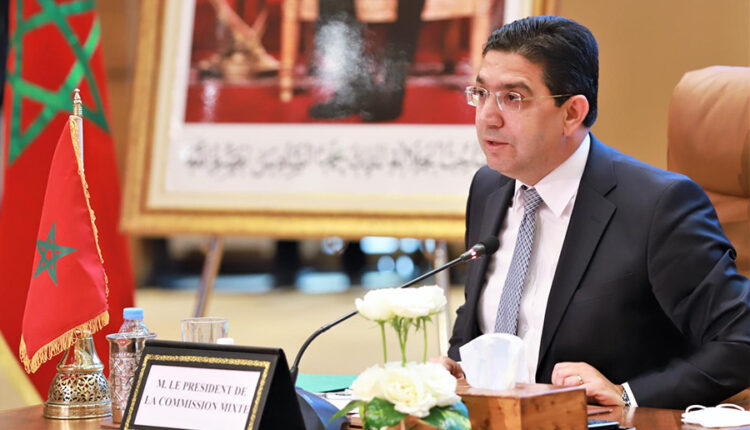Morocco Has Spared No Effort in Supporting Multilateral Actions to Fight Terrorism – FM
Tangier – Morocco, under the leadership of HM King Mohammed VI, Morocco has spared no effort in supporting multilateral actions for the fight against terrorism, Minister of Foreign Affairs, African Cooperation and Moroccan Expatriates Nasser Bourita said on Friday in Tangier.
Speaking at the start of the second High-Level Meeting of Heads of Counter-Terrorism and Security Agencies in Africa, or “Marrakech Platform,” which was co-chaired by the Kingdom of Morocco and the United Nations Office of Counter-Terrorism (UNOCT), Bourita said, “Working according to multilateralism approach in the fight against terrorism is key for His Majesty King Mohammed VI.”
He further emphasized how Morocco has generously supported numerous UNOCT Rabat Office training initiatives in a number of ways, including politically, financially, technically, and in-kind.
Vladimir Voronkov, Under-Secretary-General of the United Nations Office of Counter-Terrorism, was commended for his work in this regard. He “continues to be an efficient partner to Morocco and committed advocate of African concerns and priorities as well as a partner of a global approach to counter terrorism” in this area.
According to Bourita, “no State can effectively address terrorism in isolation: collaboration with partners is essential,” and “our ability to do so depends heavily on the strength of cooperation and partnership.”
In this regard, Mr. Bourita emphasized the significance of “developing appropriation of African responses to combat terrorism” by African nations.
Assuring that Morocco is prepared to contribute to the successful implementation of this effort in accordance with His Majesty King Mohammed VI’s High Instructions in this area, he emphasized that Africa should also learn to rely on itself to engage in an African vision for the battle against terrorism.
The minister said that on the eve of the Global Coalition to Defeat Daesh Ministerial Meeting, which will take place in Riyad, Saudi Arabia, “we have to convey our assessment, concerns, and vision to the Global Coalition so that they can take them in due consideration.”
He stated that Morocco, one of the co-chairs of the Africa Focus Group together with Italy, Niger, and the United States, is prepared and available to do its part in this regard.
The Minister also emphasized that the relationship between terrorist and separatist groups is continuing to develop in a worrying fashion, endangering the national sovereignty of several nations, and that terrorists are moving their operations from the Sahel region to western coastal Africa.
We cannot allow ourselves to ignore this peril. We must act quickly to tackle it, he urged.
Despite the considerable advancements made in the battle against terrorism, Bourita issued a warning about the current environment, which is characterized by the threat of terrorism in Africa.
He noted that terrorist groups frequently target civilians and military installations, taking advantage of permeable borders and difficult living conditions of local people. “We are all aware that the region is witnessing a devastating surge in terrorist attacks and violence,” he added.
The Minister claims that these numbers accurately reflect the reality, particularly given that sub-Saharan Africa accounted for 4,023 of the 4,023 total terrorism-related fatalities globally, or 60% of all deaths.
He lamented that, “In 2022, the Sahel region accounted for more terrorism deaths than both South Asia and the MENA region combined,” and said that terrorist organizations exploit cutting-edge and modern technologies like drones, virtual assets, and encrypted communication platforms.
According to Bourita, who noted that 19 armed separatist groups are active in 22 African countries, “Africa is the only continent where three branches of ISIS and Al-Qaeda are active.”
Additionally, he reiterated Morocco’s dedication to the development of the “Marrakech platform” as a symbol of “its unwavering engagement toward its continent.”
In this regard, he presented “concrete proposals” that could be put into action within the parameters of the Marrakech Platform, such as the holding of Joint Training programs that could bring together personnel from counterterrorism agencies in order to foster mutual understanding of each other’s advantages, disadvantages, and operational processes.
He viewed the action-oriented nature of the Marrakech Platform as a “key attribute” that must be preserved, adding that the platform’s action-oriented vision must be maintained.
While making pronouncements is simple, he emphasized that true multilateralism involves coupling words with deeds.
In order to expedite coordination, encourage information sharing, and facilitate collaborative work, the Minister also underlined the necessity of forming joint working groups inside the “Marrakech Platform” that can concentrate on specific regional threats.
In order to promote the creation of mutually beneficial synergies and regional solutions tailored to specific local settings, this also entails enhancing regional cooperation with newly emerging counterterrorism frameworks.
38 high-level delegations from international, regional, and sub-regional organizations involved in counterterrorism will be present at the second High-Level Meeting of Heads of Counter-Terrorism and Security Agencies in Africa, or “Marrakech Platform,” which will take place over two days.
Read also : Morocco unanimously elected vice-president of 78th UNGA


